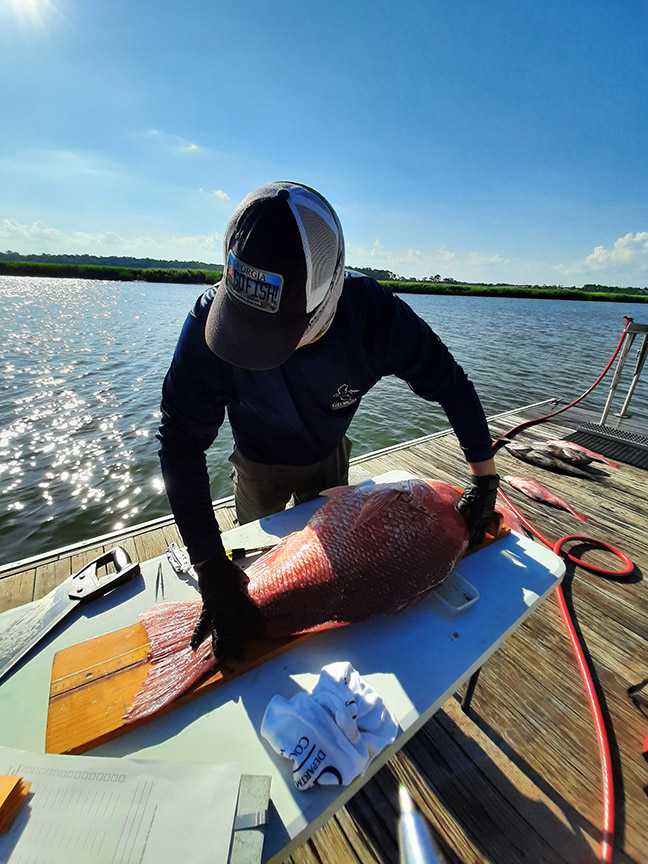
The Coastal Resources Division (CRD) of the Georgia Department of Natural Resources is seeking help from recreational saltwater anglers in collecting data during the upcoming red snapper harvest season July 14 and 15.
The National Oceanic and Atmospheric Administration (NOAA) is allowing the recreational harvest of one red snapper per person per day with no minimum size restrictions in South Atlantic federal waters at least three miles offshore during the period. CRD is asking anglers who fillet their fish to donate the carcasses at freezers located along Georgia’s coast at marinas and bait shops. A complete list of locations is available at CoastalGaDNR.org/MarineCarcass.
These carcasses will be examined by CRD biologists to gather data on age, size, and growth. This information will be shared with regional and federal partners and used in fishery management.
“Fishery management can be a difficult task,” said Carolyn Belcher, CRD’s Chief of Marine Fisheries. “But the more data we have, the better our estimates are. We have a wide variety of surveys and programs to gather data, and the input from recreational anglers is a vital part of our data-gathering process.”
By donating red snapper carcasses, anglers are helping conserve the fishery for future generations, Belcher said.
When an angler or charter boat group donates fish carcasses at a freezer station, the donor must complete a registration card and attach it to the plastic bag holding the carcasses. Two donors will be randomly selected to each receive a $50 gift card to Academy Sports sporting goods store. The donation freezer stations are not limited to red snapper, and anglers are invited to donate carcasses of other species as well.
Carcass donation is not the only way recreational anglers can help CRD collect valuable fisheries data. Anglers can volunteer information about their fishing trips by visiting MyFishCount.com or downloading the mobile app in the Apple App Store or Google Play store for Android by searching “MyFishCount.”
Anglers are also likely to see CRD staff at marinas, boat ramps, beaches and other common fishing locations. These staff members are collecting information as part of the Access Point Angler Intercept Survey. The short, in-person survey collects data about how and generally where anglers fished, how long they fished, which species were targeted and other data points. All data are given voluntarily and are confidential.
Additionally, anglers are encouraged to visit SAFMC.net/Best-Fishing-Practices to learn more about releasing fish (e.g., videos of fish released with a descending device, how to use various types of devices, best practices to release fish). Descending devices reverse the effects of rapid ascension of fish, which happens when a fish is hooked at depths of about 50 feet or greater and quickly reeled to the surface. When this occurs, the fish’s swim bladder, an organ that controls the fish’s buoyancy, expands uncontrollably and can cause the fish’s internal organs to protrude outside its body. This syndrome is known as “barotrauma.” Discarded fish experiencing barotrauma are unable to return to appropriate depths after they have been released and are frequently subject to predation. Releasing at depth has the potential to significantly improve survival. Since July 15, 2020, descending devices are required to be on board private recreational, for-hire and commercial vessels when targeting snapper-grouper species in federal waters in the South Atlantic. Click here for more information.
Additional information about the red snapper recreational mini-season can be found in the NOAA press release “Openings of Recreational and Commercial Red Snapper Seasons in South Atlantic Federal Waters.”
For more information about CRD’s Marine Fisheries Section, or to learn more about how anglers can conserve marine fisheries for present and future generations, visit CoastalGaDNR.org contact CRD’s communications specialist, Tyler Jones, at 912-262-3140 or tyler.jones@dnr.ga.gov.


Chattooga Local News
Jack Zibluk Announces State Senate Run, Aiming to Unseat Senator Colton Moore

Bulloch Public Safety
7/08/2025 Booking Report for Bulloch County

Bulloch Public Safety
Statesboro Police Dept: Statement Regarding Anthony Kent’s Plea Agreement

Chattooga Local News
Nurse’s Intuition Ensured Stroke Victim Received Quick Care

Bulloch Public Safety
06/09/2025 Booking Report for Bulloch County

Bulloch Public Safety
06/23/2025 Booking Report for Bulloch County

Bulloch Public Safety
06/30/2025 Booking Report for Bulloch County

Bulloch Public Safety
06/16/2025 Booking Report for Bulloch County

Bulloch Public Safety
06/19/2025 Booking Report for Bulloch County





